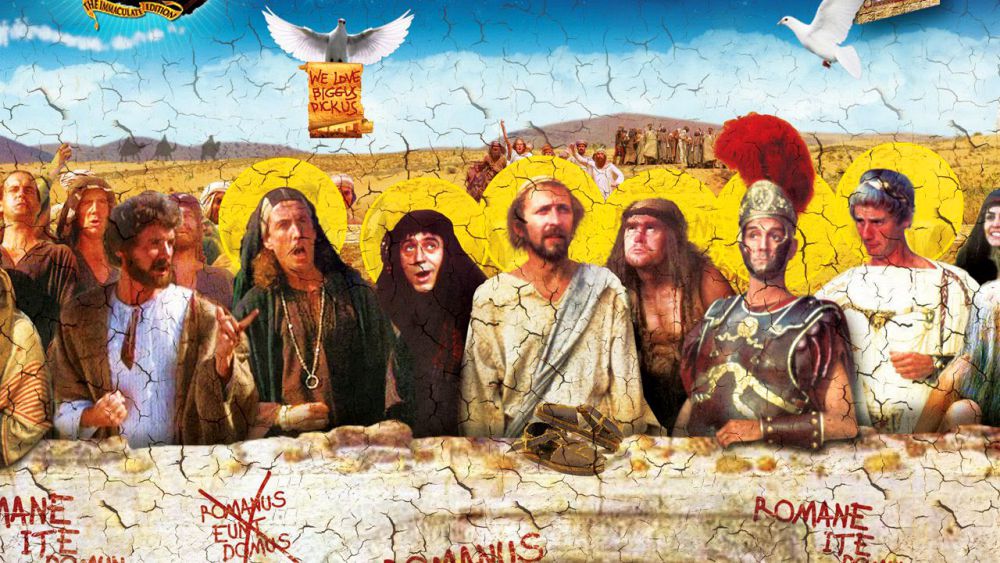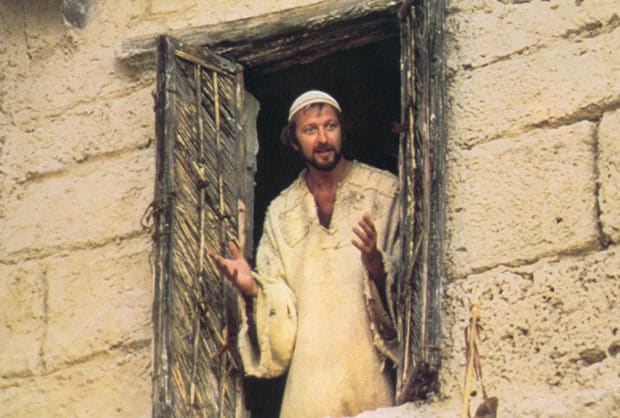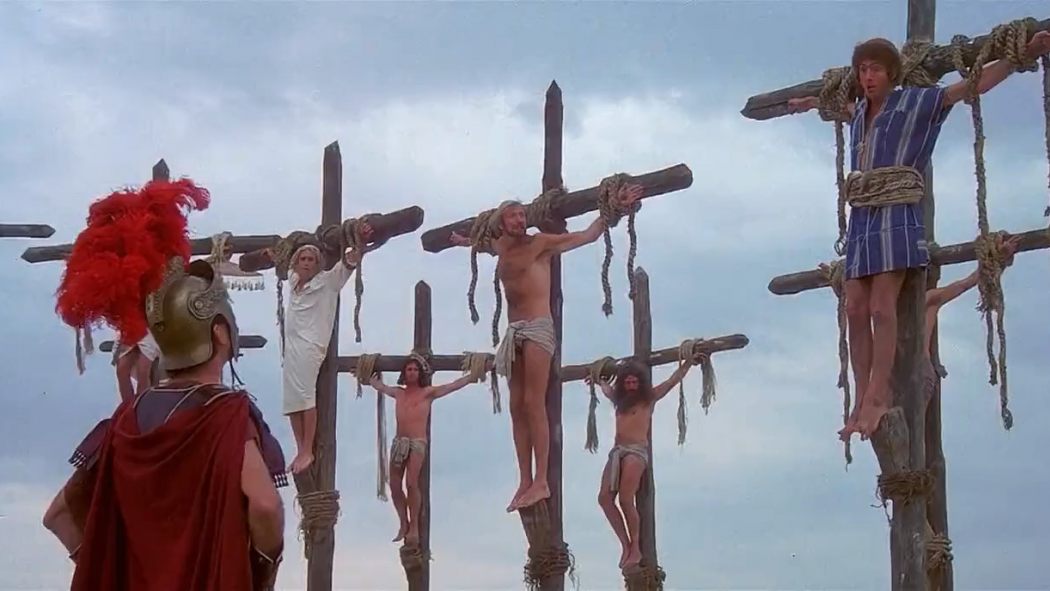
“I think along with the rest of the English nation that [Life of Brian] is the best Python film… It’s the only film we ever made that was proximately a good story. It’s also about things that are very important.”
– John Cleese
“He’s not the Messiah, he’s a very naughty boy!”
It’s rather remarkable to think that back in 1979 fans of the British comedy team Monty Python had to brave hymn-singing demonstrators and deistic picketers outside of cinemas if they wanted to see Life of Brian.
It’s remarkable too that the film began its life as something of a joke––when questioned what the next Python picture would be, Eric Idle facetiously quipped, “Jesus Christ: Lust for Glory”. But Life of Brian would mature, as it were, into a more refined means of expression. Well, you know, more refined for Monty Python, that is.
Moving away from the innovative television series Monty Python’s Flying Circus (1969–1970), this film represented the troupe’s second formal film after 1975’s The Holy Grail (though as fans know, in 1971 the Python’s released And Now For Something Completely Different––a sketch comedy film based on their TV show and featuring vignettes from the first two series).
Using the template perfected with the Holy Grail, the Pythons not only conceived and wrote their own material, they also played multiple roles, with the eponymous hero of Brian Cohen being taken on by Graham Chapman. Brian is something of a boor, a peasant of Judea who at first gets confused for Jesus Christ.
Reach out and touch faith

Brian, born at approximately the same time and roughly in the same place as Jesus––though the Three Wise Men, after receiving a bit of a tongue lashing from Brian’s mother (“Well, what are you doing creeping around a cow shed at two o’clock in the morning? That doesn’t sound very wise to me.”), realize the true Son of Man is actually in the stable right next door––his life seems curiously linked to Christ. As an adult a silly series of false impressions, fuck ups, and misconstructions once more finds Brian mistaken for the Messiah as well as pursued by his supporters.
After getting in cahoots with a parochial group of revolutionaries resolved on bad-mouthing and overthrowing Roman rule in Judea (“If you want to join our group you’ve got to really hate the Romans!”), Brian is bird-dogged by the unwashed masses who are adamant that he’s the Son of God before he’s finally captured and arrested by the Romans who then crucify the poor stooge.
“What Jesus fails to appreciate is that it’s the meek who are the problem.”
– Reg (played by John Cleese)
Maybe you’re just zealous?

The Pythons were largely unsuccessful in avoiding a volley of accusations that Life of Brian was blasphemy, no matter how often they plainly pronounced that Chapman’s Brian was not the Lamb of God.
Though intentionally playing lewd and loose with the New Testament and its cast of widely known characters to punctuate laudable and incisive aims in the name of satire and jest, many religious groups saw the hoopla as an assault on their deeply held bullshit beliefs. Ha! “No one has the right not to be offended,” Cleese once famously remarked, regarding the ire he had helped to invoke in the prayerful and humorless.
In Britain many local authorities either banned the film outrightly or Christened it with a restrictive X certificate rating in a belligerent attempt to stifle the film.
The end result of all the controversy and contention gave Life of Brian a higher profile than the Pythons had ever planned on, and in the UK it ended up being the fourth-highest grossing film of 1979. “So funny it was banned in Norway!” proclaimed promo posters in Mother Svea, where it was a smashing success, and in North America it was the biggest British film of the year.
Ostensibly an assembly of surreal sketches with batches of violence and every shade of comedy gluing together a slack narrative, Life of Brian has more story than any other film in the Python canon.
By the time the final scene rolls around with a chorus of singers joining Brian and his fellow blasphemers on the cross for a closing number of “Always Look on the Bright Side of Life,” it’s hard to think of any comedy that ends on such a rotten hand. Crucified, and abandoned, only the raw deal of misunderstood martyrdom to give him cruel complacency, Brian’s run of luck has gone rotten.
“I’m Brian and so’s my wife!”
– Gregory (played by Terence Bayler)
The last temptation of Christ?
An international hit that no one saw coming, Life of Brian nevertheless almost didn’t get made. Even though previous Python projects had performed well and their popularity was considerable, it was former Beatle and all around good egg George Harrison (he has an uncredited cameo in the film as Mr. Papadopoulos) who, via his newly minted production company, HandMade Films, the ended up financing the film.
HandMade Films, by the way, would go on to finance and distribute many more quality British films including; Pythoner Terry Gilliam’s Time Bandits (1981); Bruce Robinson’s wonderful Withnail and I (1987); and Guy Ritchie’s directorial debut from 1998, Lock, Stock and Two Smoking Barrels, amongst them.
“There’s no Messiah in here. There’s a mess all right, but no Messiah.”

Surfeited with memorable scenes and quotable gags, from revolutionary Reg’s ridiculous speech asking unashamedly, “What have the Romans ever done for us?” (adding, “All right, but apart from the sanitation, medicine, education, wine, public order, irrigation, roads, the fresh water system and public health, what have the Romans ever done for us?”), to angry ex-Lepers, erudite Roman centurions, a speech-impeded Pontius Pilate (“I will not have my fwends widiculed by the common soldiewy!”), to the famed Roman partisan Biggus Dickus and his charming wife Incontinentia Buttocks, Life of Brian is regularly referred to as one of the greatest British comedies of all time.
Smartly and scabrously satirizing the mindless devotion and ignorant desperation to believe religiously in something, one of the most memorable jabs at secularist thinking occurs when Brian sermons a large assembly. He proclaims the importance of independent thought only to hear the throng reply in startling unison “yes, we are all different!” And then, desperately Brian argues: “You got to think for yourselves! You’re all individuals! You’re all different!” And a voice cries out: “I’m not!”
Amongst Python fans it invariably comes down to either the Holy Grail or Life of Brian as to what is considered their finest work, and to argue it really just comes down to personal preference. Personally I cannot imagine what it would be like to not find joy and gesture from these brilliant comedians, to picket their merry-go-round like it were a source of malcontent.
No, these distinguished comics and razor-sharp satirists are second only to the Marx Brothers as far as madcap imagination goes. But when push comes to shove as matters of comedy is concerned I can’t help but chortle at an exhausted Brian’s surrender: “Alright, I AM the messiah! Now, FUCK OFF!”
Author Bio: Shane Scott-Travis is a film critic, screenwriter, comic book author/illustrator and cineaste. Currently residing in Vancouver, Canada, Shane can often be found at the cinema, the dog park, or off in a corner someplace, paraphrasing Groucho Marx. Follow Shane on Twitter @ShaneScottravis.